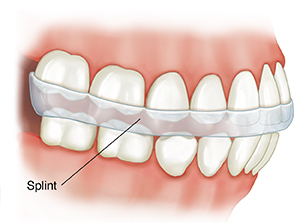Dental Treatment for Temporomandibular Disorders (TMD)
You have been diagnosed with temporomandibular disorder (TMD). This term describes a group of problems linked to the temporomandibular joint (TMJ) and nearby muscles. The TMJ is located where the upper and lower jaws meet. It is part of a structural system that includes the teeth. Because the joint and teeth work together, a problem with your teeth and bite can be linked to TMD.
The first step of treatment is to try self-care strategies such as staying away from triggers that cause pain. You can also try jaw exercises. Work to reduce stress in your life. Your healthcare provider may also advise medicines. But your dentist may suggest other treatments if the problem continues or if you grind your teeth. In some cases, you may be referred to an oral surgeon.
If you grind or clench your teeth
Teeth grinding (bruxism) or clenching strains the TMJ and related muscles. If you have these habits during the day, doing self-checks can help you stop. But it’s hard to control these habits when you’re asleep. That’s when using a splint may help:
-
How a splint works. A splint is an appliance that fits in the mouth. It may also be called an orthotic or night guard. There are different kinds of splints for different kinds of needs. A splint can keep the upper and lower teeth apart. This helps protect tooth surfaces from grinding. A splint can also be made to reduce strain on the area.
-
Wearing and caring for your splint. To make a splint, your dentist or orthodontist may take impressions of your teeth. Then a splint will be made to fit your mouth. A splint:
-
May be worn during the day or only at night. Ask when and how often you should wear your splint.
-
Should be cleaned before you put it in and after you take it out. Ask your dentist or orthodontist how to clean the splint.
-
Should be kept in a protective case, away from the reach of children and pets. This helps keep the splint from getting dirty or broken.

Seeing an oral and maxillofacial surgeon
Your dentist may refer you to an oral and maxillofacial surgeon if self-care, medicines, and other noninvasive treatments don't work. This surgeon will specialize in treating TMD. They may advise shots (injections) to treat the pain. Surgery is rarely needed for TMD. Talk with your provider to see if surgery might be right for you.
Online Medical Reviewer:
Jessica Gotwals RN BSN MPH
Online Medical Reviewer:
Michael Kapner MD
Online Medical Reviewer:
Rita Sather RN
Date Last Reviewed:
8/1/2022
© 2000-2024 The StayWell Company, LLC. All rights reserved. This information is not intended as a substitute for professional medical care. Always follow your healthcare professional's instructions.